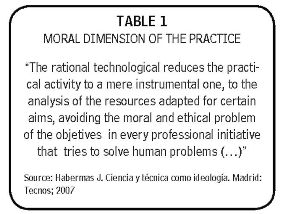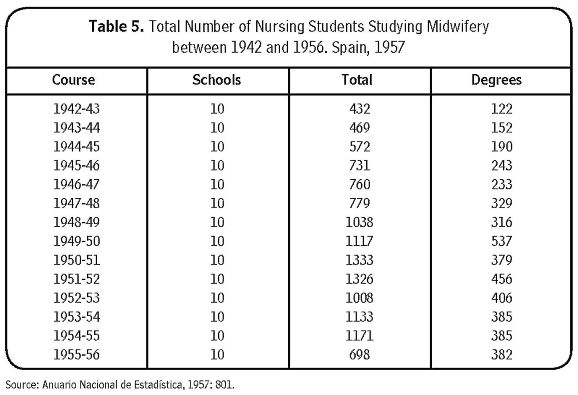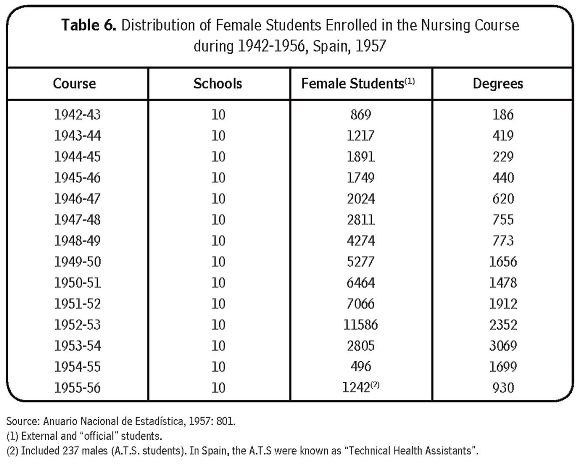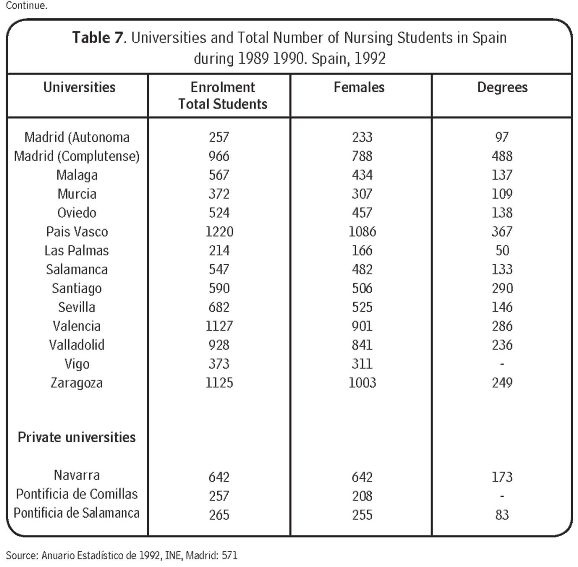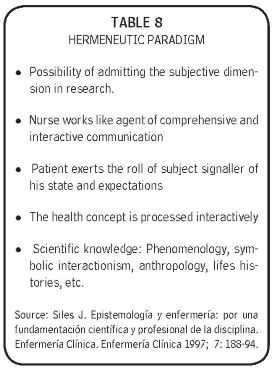Services on Demand
Journal
Article
Indicators
-
 Cited by SciELO
Cited by SciELO -
 Access statistics
Access statistics
Related links
-
 Cited by Google
Cited by Google -
 Similars in
SciELO
Similars in
SciELO -
 Similars in Google
Similars in Google
Share
Aquichan
Print version ISSN 1657-5997
Aquichan vol.10 no.3 Bogotá Sept./Dec. 2010
Political Systems and the Perspective on Nursing Education during the Spanish Transition (from the Franco Regime to Democracy). A Contribution based on Nursing History
Sistemas políticos y perspectiva de la educación de enfermería en la transición española (del franquismo a la democracia). Una contribución desde la historia de la enfermería
Sistemas políticos e perspectiva de ensino da enfermagem na transição espanhola (do regime de Franco à democracia). Uma contribuição da história da enfermagem
José Siles1
María del Carmen Solano-Ruiz2
Genival Fernández de Freitas3
Taka Oguisso4
1 Doctor en historia. Licenciado en pedagogía y diplomado en Enfermería, Catedrático de la E.U. de Enfermería, Departamento de Enfermería, Universidad de Alicante, España. jose.siles@ua.es
2 Doctora en cultura de los cuidados. Licenciada en Antropología Social y Cultural. Enfermera. Profesora titular de Enfermería de la Universidad de Alicante, España. carmen.solano@ua.es
3 Doctor en enfermería. Licenciado en Enfermería y en Derecho. Profesor titular. Escuela de Enfermería Universidad de Sao Paulo, Brasil. genivalf@usp.br
4 Doctora en Derecho. Licenciada en Enfermería. Profesora titular. Escuela de Enfermería de la Universidad de São Paulo, Brasil. takaoguisso@vol.com.br
Recibido: 20 de julio de 2010
Aceptado: 27 de octubre de 2010
ABSTRACT
The aim of this study is to describe the changes in nursing education during the process prior to and after the establishment of democracy in Spain. It begins with the hypothesis that differences in social and political organization influenced the way the system of nursing education evolved, keeping it in line with neopositivistic schemes and exclusively technical approaches up until the advent of democracy. The evolution of a specific profile for nursing within the educational system has been shaped by the relationship between the systems of social and political organization in Spain. To examine the insertion of subjects such as the anthropology of healthcare into education programs for Spanish nursing, one must consider the cultural, intercultural and transcultural factors that are key to understanding the changes in nursing education that allowed for the adoption of a holistic approach in the curricula.Until the arrival of democracy in 1977, Spanish nursing education was solely technical in nature and the role of nurses was limited to the tasks and procedures defined by the bureaucratic thinking characteristic of the rational-technological paradigm. Consequently, during the long period prior to democracy, nursing in Spain was under the influence of neopositivistic and technical thinking, which had its effect on educational curricula. The addition of humanities and anthropology to the curricula, which facilitated a holistic approach, occurred once nursing became a field of study at the university level in 1977, a period that coincided with the beginnings of democracy in Spain.
KEY WORDS
Nursing, care, nursing history, political systems, Spain. (Source: DeCs, BIREME).
RESUMEN
El objetivo del estudio consiste en describir los cambios que afectan a enfermería dentro del sistema educativo durante el proceso previo y posterior al establecimiento de la democracia en España. Se parte de la siguiente hipótesis: las diferencias en la organización social y política influenciaron la evolución de la enfermería española manteniéndola dentro de los esquemas del neopositivismo y los enfoques exclusivamente técnicos hasta la llegada de la democracia. La relación entre los sistemas de organización social y política en España ha determinado la evolución de un perfil específico de enfermería en el sistema educativo. Para comprender la integración de asignaturas como la antropología del los cuidados en los programas educativos de la enfermería española hay que se considerar los factores culturales, interculturales y transculturales que constituyen las claves para el entendimiento de los cambios en la educación enfermera haciendo posible la adopción de una perspectiva holística en los currículos. Hasta la llegada del sistema democrático en 1977, la educación en la Enfermería española fue solamente de naturaleza técnica y los roles de las enfermeras se limitaban al cumplimiento de tareas y procedimientos definidos por el pensamiento burocrático característico del paradigma racional tecnológico. Conclusiones: Durante el largo período predemocrático la enfermería española estuvo bajo la influencia del pensamiento neopositivista y técnico, lo cual se plasmaba en los currículos educativos. La integración en los currículos de materias humanísticas y antropológicas que facilitaban el enfoque holístico se produjo tras la integración de la enfermería en la Universidad en 1977 coincidiendo con los inicios de la democracia en España.
PALABRAS CLAVE
Enfermería, cuidado, historia de la enfermería, sistemas políticos, España. (Fuente: DeCs, BIREME).
RESUMO
Objetivo: descrever as mudanças que afetam a enfermagem no sistema de ensino durante o período pré e pós-estabelecimento da democracia na Espanha. A hipótese de partida é: as diferenças na organização social e política influenciaram a evolução da enfermagem espanhola mantendo-a dentro do positivismo e das abordagens puramente técnicas até a chegada da democracia. A relação entre os sistemas de organização social e política em Espanha determinou o desenvolvimento de um perfil específico da enfermagem no sistema de ensino. Para compreender a integração de disciplinas como a antropologia do cuidado nos programas de educação da enfermagem espanhola é necessário considerar factores culturais, interculturaisl e transculturais fundamentais para a compreensão das mudanças no ensino de enfermagem. Isso permites a adoção de uma perspectiva holística nos currículos. Até o advento da democracia em 1977, o ensino da enfermagem na Espanha era apenas de natureza técnica e os papéis dos enfermeiros eram limitados ao cumprimento de tarefas e procedimentos definidos pelo pensamento burocrático característico do paradigma racional da tecnologia. Conclusões: durante o longo período pré-democrático, a enfermagem espanhola esteve sob a influência do pensamento técnico neo-positivista, que foi incorporado nos currículos educacionais. A integração de matérias humanísticas e antropológicas no currículo, que facilitou a abordagem holística, chegou depois a integração da enfermagem na universidade em 1977, o qual coincide com o início da democracia em Espanha.
PALAVRAS-CHAVE
Enfermagem, cuidado, história da enfermagem, sistemas políticos, Espanha. (Fonte: DeCs, BIREME).
Introduction
Power differences in a society are linked to diversities in the evolution of education and educational strategies. The essential and existential dimensions of education are influenced by power relationships in society. The aim of this study is to describe the changes in nursing education during the process prior to and following the establishment of democracy in Spain. It work begins with the hypothesis that the differences in social and political organization influenced the way the system of nursing education evolved, keeping it in line with neopositivistic schemes and exclusively technical approaches up until the advent of democracy. The relationship between the systems of social and political organization in Spain has shaped the evolution of a specific profile for nursing within the educational system. To examine the insertion of subjects such as the anthropology of healthcare into education programs for the Spanish nursing, one must consider the cultural, intercultural and transcultural factors that are key to understanding the changes in nursing education that allowed for the adoption of a holistic approach in the curricula.
Background
The nature of power and ideology, their link to education, and the strategies developed for their perpetuation have influenced the way the education system has been structured (1,2). Furthermore, the transmission mechanisms for learning have been influenced strongly by power and politics (3, 4, and 5). Integrating Political Involvement and Nursing Educationemphasizes the need for nurses to develop health policy skills. Education systems also are influenced by religious political power (6, 7). In Spain, literature concerning the influence of political power on education is scarce (8, 9). A number of authors identified the false neutrality of scientific paradigms and the hierarchical and authoritarian bureaucratization of disciplines (10). Other works analyze the dogma in scientific production and deal with the subject of power and its relationship to science within the specific scope of nursing (11, 12, 13, 14, 15, and 16). Historical and anthropological work on Spanish nursing was begun in the 80's. The first publication on the anthropology of healthcare appeared in the 90's. As the decade progressed, the anthropological view of nursing in Spain continued to evolve. These publications dealt with specific topics such as pregnancy, nurses' image in the media during the Spanish Civil War, and mental health (17- 18).
Methodology
This historical study was conducted in two parts. The first involved a historical study of Spanish nursing education under the social, labour and scientific conditions that existed before (1939-1976) and after (1977-1998) the arrival of a democratic system. The rational-technological, hermeneutic and socio-critical paradigms were used to analyze the features of the period prior to and after democracy was established.
The second historical study involved a bibliographic review focused primarily on journals and monographs on Spanish nursing education. The more relevant periodical publications were reviewed, such as Rol, Enfermería Clínica, Index and Cultura de los Cuidados. The Spanish database CUIDEN (published by the Index Foundation) also was used, as was cuidatge(Uni-versidad Rovira y Virgil), and the ISBN database published by the Ministry of Culture.
Results
After the end of the Spanish Civil War in 1939, nurses returned to their old activities and traditional values, abandoning a great many of the achievements secured during the II Republic. The number of religious leaders and their impact on nursing and nursing education increased. In fact, religious leaders regained the influence lost before and during the Spanish Civil War. Nursing returned to a working situation directly related to a gender-dependant distribution of tasks and regained its condition as a predominantly female profession. Sección Femenina (The Women's Division) was founded in 1933; directly dependent on the Falange, its members specialised in the task of assistance. In 1936, Winter Aid was founded; its primary function was care of the wounded and sick in military hospitals. Consequently, it became necessary to endow these organizations with the most basic and indispensable knowledge. In 1937, Social Aid was founded and its first by-laws established three delegations: Education, Social Aid and Hospitals. The future directors of nursing schools were selected from among the most outstanding students. In 1942, Traditionalist Spanish Falange Nurses was constituted in four sections.
A high degree of ideological and religious indoctrination was customary. Because of the unavoidable requirement of being a member of Sección Femenina in order to study nursing or to become a teacher, an important part of education for teachers and nurses was dedicated to religion and prayer. Ibáñez Martín was the Minister of Education from 1939 to 1951, a period characterised by immobility and religious and ideological predominance (Falange) in primary, secondary and university education.
The Beginning of the Technocratic Period
The shift from education based on religious and political ideas to education that was more technocratic and utilitarian took place when Ruiz Giménez was in charge of the Ministry of Education.
At this opening stage, secondary education continued to polarize the educational system. In 1953, two levels (elementary and higher) were established in secondary school. At the elementary secondary-school level, one could begin to study for a short degree, i.e. nursing. During Ruiz Giménez's time, studies for practicantes (interns) and nursing were combined. Ultimately, this period led to the creation of the Degree of Technical Health Assistant (A.T.S.) in 1955. In this context of technological medicine and technocratic scientific development, nursing was regarded solely as an auxiliary profession subordinate to the figure of the physician.
Technocracy, with its limitations, influenced nursing progress by hindering the secularisation of hospital workers (Tables 1 and 2). However, to understand this process of technification within the context of nursing, it is important to bear in mind one of the most decisive factors in the development of the health system. Parallel to the improvements in education, technocrats favoured a politically-influenced development of hospitals and encouraged the construction of healthcare facilities through several development plans implemented during the Franco regime (i.e. the First and Second Development Plans).
"The rational-technological regime reduces practical activity to merely an instrumental role and to the analysis of resources adapted for certain aims. It avoids the moral and ethical problems of the objectives in every professional initiative that attempts to resolve human problems (...)"
The Role of Nursing According to the Rational-Technological Paradigm:
Nurse: Executor of techniques and subordinate to other professionals. (...)
Patient as a "passive recipient" of procedures and educational advice
Nursing dependent on research in other disciplines.
Later, with publication of the Laws on Hospital Regulation (1962), the number of hospitals tripled to more than one hundred, and the number of hospital assistants came to approximately 70,000 by 1970. In 1953, the total number of people with social security surpassed 29%; in 1968, the proportion of Spanish state beneficiaries who were insured was 72%. The same developmental movement influenced nursing education, inasmuch as a considerable effort was made to endow new and previously existing hospitals with a technically trained nursing staff and to substitute or recycle the religious staff (nuns) working as nurses at health centres. This was an extremely important period in nursing history, because it was when the foundation for the leap towards a professional situation was laid. Parallel to this, the education system improved while Lora Tamayo was head of the Ministry of Education. He extended the compulsory school age to 14 years (1964) and made a "Bachiller Superior" (Upper Secondary) degree a mandatory prerequisite for studying to become a teacher (Magisterial). During those years, a person's profession was determined largely by their gender.
Male A.T.S. picked up where the old practicantes left off (most were men). These professionals obtained their degrees from medical schools where they received a fundamentally theoretical education with a technical orientation. As to their destination, they worked essentially in local healthcare settings and the old A.P.D. (Atención Publica Domiciliaria- Public Home Care).
Female A.T.S. were educated in schools integrated into hospitals, receiving mostly practical training, although the technological aspect was emphasized. The increase in this type of personnel was closely linked to the development of health institutions.
The curricula during the 60's and 70's included subjects that had little to do with the needs of the profession and were concerned more with religious and ideological matters (religion, the development of a nationalistic spirit and - in the schools for women - subjects related to house management and domestic tasks). However, these matters were deliberately ignored in many schools, thanks to the good will of a number of professors (Table 3).
A Historical Fact: The Option of University Integration
In 1968, Villar Palasi took over as head of the Ministry of Education and Science. Soon after, in 1970, a decisive law for the future of nursing would result in nursing becoming a field of study at the university level. This legislation represented an attempt to answer the propositions established by Moyano's hundred-year-old law (1857), which continued to persist in the Spanish education system and particularly in Spanish nursing, which was being moulded professionally and academically by it. The General Education Act provided for diploma studies at the university level. In this context, nurses were able to choose between vocational training, and studies for a university degree. In February 1976, the Comisión Interministerial (Cross-Ministerial Commission) was constituted to reform A.T.S. studies. It was comprised of representatives from a number of official agencies (Dirección General de Sanidad, Ministerio de Educación y Ciencia, Instituto Nacional de Previsión, Sindicato de Actividades Sanitarias and the three branches of the Consejo General de A.T.S.), in addition to two doctors and two nurses as advisory members. To justify their decision to include studies at the university level, the experts used the European Council guidelines on the activities of nurses responsible for general care (77/453/CEE). The strain imposed by the work force, mainly from the hospital sector, and the pressure brought to bear by professionals who were part of the provincial A.T.S. associations brought them all together to form a National Co-ordinating Committee, ultimately achieving the addition of nursing at the university level. A Bachelor's Degree in Nursing (as at the University of Alicante) became a reality during the 1998-99 academic year, after a long struggle and with the hope that this experience would serve as model and be implemented nationwide.
Historical Evolution of Studies in Spain to Become "Practicantes," Midwives, Nurses (1942-43 / 195556) and A.T.S. (195657/1976-77)
After World War II and as a consequence of the international isolation that totalitarian Spain experienced, the transformation regarding authoritarianism was slow, but irreversible. Between the course" in 1942-43 to the one in 1955-56, a total of 57, 496 students were enrolled (Table 4). The course in 1951-52 had the highest enrolment.
Midwives
This period witnessed a clear evolution in midwifery studies. With unification of the curricula and the creation of the title and profession of Technical Health Assistant (A.T.S.), midwifery was established as an A.T.S. specialty. During this academic period, a total of 12.567 students were enrolled (897 per course) (Table 5).
The following table shows the total number of students enrolled to study midwifery during the period between 1942 and 1956.
Nurses
Nursing studies began in 1915 and reached their peak of development during the II Republic, when there was a massive influx of women. Between 1942-43/195556, a total of 49,816 students were enrolled (3,558 per course) (Table 6).
The following table shows the number of students enrolled between 1942 and 1956.
The University Stage and Nursing Graduates
The democratic transition in Spain was important to improving academic teaching. In 1989-90, 20,228 students were
enrolled and 5,973 degrees were granted by a total of 31 university schools, three of them private. The following table shows the universities and the total number of nursing students enrolled in Spain during the period from 1989 to 1990 (Table 7).
The Origin of Nursing Research in Spain
Híades is the first Spanish journal dedicated exclusively to the history of nursing. It first appeared in August 1994, encouraged by the efforts of the Andalusian Group for Research on Nursing History (GAIHE). The first issue of Cultura de los Cuidados appeared in August 1997. This journal is characterized by a zeal for the development of humanistic nursing in four fundamental areas: phenomenology, anthropology, history and theory, and nursing ideas and principles pursuant to the hermeneutic and socio-critical paradigms (Tables 8 y 9). Moreover, the first Spanish association of history and the anthropology of healthcare was established as a result of this publication.
Hermeneutic Paradigm:
- Possibility of permitting a subjective dimension in research.
- The nurse functions as an agent for comprehensive and interactive communication.
- The patient is a subject who signals his/ her state of health and expectations.
Socio-critical Paradigm:
- Need to develop a historical conscience.
- Subjectively interprets the nurse's role as an agent of change.
- Patients behave as subjects involved in the control and dynamics of their health process.
- Positive concept of health: Reworking of that concept on the part of the subject.
- Constructed knowledge, dialectically critical research, study of contexts, and consideration of the subject-patient (anthropology, history, critical sociology).
Among other results, this study found only one Spanish journal that dedicates a section to the anthropology of healthcare (Cultura de los Cuidados in 1997); while another publication often includes articles on the subject (Index, in 1988). The other journals consulted only occasionally contain articles on the anthropology of healthcare. The characteristics of the articles published in Cultura de los Cuidados and Indexpoint to an evident change of paradigm. Thus, three different periods can be distinguished, given the political system at the time and the characteristics of Spanish nursing education.
The first stage is dominated by the rational-technological paradigm (Figure I). It coincides with the authoritarian period (1855-1977) when nurses were not regarded as independent professionals, but as physicians' assistants with no scientific knowledge. During this period, nurses performed only simple tasks, with the patient as the recipient. In other words, it is possible to say that the moral dimension of nursing practice was not taken into account during that time.
The hermeneutic paradigm pertains to a shorter period, which began when nursing became a field of study for a university degree (coinciding with the beginning of the democratic transition in 1977) and lasted up until enactment of the General Health Act in 1986. During that period, the nurse became an interpreter of the patient's situation, as it was the nurse who had a command of know-how, communication skills and psychology, and a historical, sociological and anthropological education. Yet, nurses were unable apply all of this in practice, because the labour system was not structured for university-trained nurses.
Finally, the phase when the socio-critical paradigm began coincides with enactment of the General Health Act and continues to this day. In this phase, nurses are agents of socio-health change and their knowledge can be applied in practice, since the General Health Act recognizes them as university-trained health professionals.
Conclusions
During the long pre-democratic period, Spanish nursing was governed by positivistic logic and a technical approach, which influenced educational curricula. The addition of humanistic and anthropological subjects to the curricula facilitated a holistic approach and occurred in 1997, when nursing became a field of study at the university level. This coincided with the onset of democracy in Spain.
The variability of the political and social system has had a strong influence on the adoption of nursing paradigms in education, and on development of the anthropology of healthcare. The false neutrality of the scientific paradigms and the hierarchical and authoritarian bureaucratization of the disciplines are evident, particularly on the part of specialists in the socalled emerging, new or developing disciplines, which is the case of nursing education.
Practicantes, midwives and nurses suffered an educational system in which ideology, political indoctrination and religious ideas played a paramount role. With the arrival of democracy in Spain, nursing finally became a field of study for a university degree 1977. This did away with the nurse's image as a mere technician. After being incorporated into the university curriculum, nursing began an evolution that culminated with adoption of the hermeneutic and socio-political paradigms.
Historical, sociological and anthropological research acquired a prominent role (in curricula) following the adoption of approaches endorsed by the hermeneutic and socio-political paradigms. The interest in nursing anthropological studies and their development were preceded by a period of historiographic development.
REFERENCES
1. Foucault M. Un diálogo sobre el poder y otras conversaciones. Madrid: Alianza; 2008. [ Links ]
2. Foucault M. Estrategias de poder. Barcelona: Paidós; 1999. [ Links ]
3. Suchodolski B. Pedagogia de 1'essència i pedagogia de l'existència. Barcelona: Eumo; 1986. [ Links ]
4. Siles J y Solano C. (ed.) Antropología educativa. Alcoy: Marfil/ Instituto Ciencias de la Educación. Universidad de Alicante; 2009. [ Links ]
5. Habermas J. Ciencia y técnica como ideología. Madrid: Tecnos; 2007. [ Links ]
6. Conger C.& Johnson P. Integrating Political Involvement and Nursing Education. Nurse Educator 2000; 25(2): 99-103. [ Links ]
7. Bonald LA. Teoría del poder político y religioso. Madrid: Tecnos; 1988. [ Links ]
8. Puelles M. Educación e ideología en la España Contemporánea. Madrid: Tecnos; 2001. [ Links ]
9. Viñao A. Política y educación en los orígenes de la España contemporánea. Madrid: Siglo XXI; 1982.9. Kuhn TS. Qué son las revoluciones científicas? Barcelona: Paidós: Barcelona; 1995. [ Links ]
10. Powkewitz TS. Las tecnologías culturales como control. Prácticas culturales: Revista Educación y Pedagogía 2003; 15(37): 33-51. [ Links ]
11. Kuhn TS. La estructura de las revoluciones científicas. Madrid: Fondo de Cultura Económica; 2005. [ Links ]
12. Medina JL & Sandín MP. Fundamentación epistemológica de la teoría del cuidado. Enfermería Clínica 1994; 5: 221-225. [ Links ]
13. Medina JL & Sandín MP. Epistemología y enfermería: Paradigmas de investigación en enfermería. Enfermería Clínica 1995; 5: 40-52. September-October. [ Links ]
14. Siles J. & García E. Las características de los paradigmas científicos y su adecuación a la investigación en enfermería. Enfermería Científica 1995; 160: 10-15. July-August. [ Links ]
15. Siles J. Historia de la enfermería. Alicante: Aguaclara; 1999. [ Links ]
16. Siles J. Epistemología y enfermería: por una fundamentación científica y profesional de la disciplina. Enfermería Clínica 1997; 7: 188-94. [ Links ]
17. Siles J. Historia de la enfermería comunitaria en España. Un enfoque social, político, científico e ideológico de la evolución de los cuidados comunitarios. Index de Enfermería 1997; 24: 25-31. [ Links ]
18. Eseverri C. Historia de la enfermería española e Iberoamericana. Madrid: Universitas; 1995. [ Links ]













